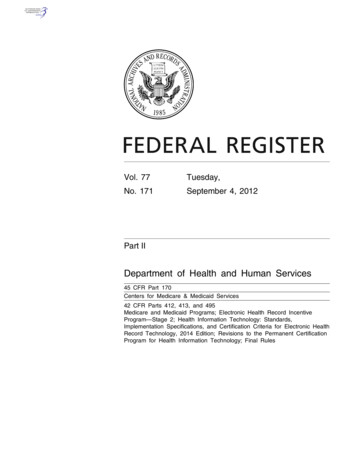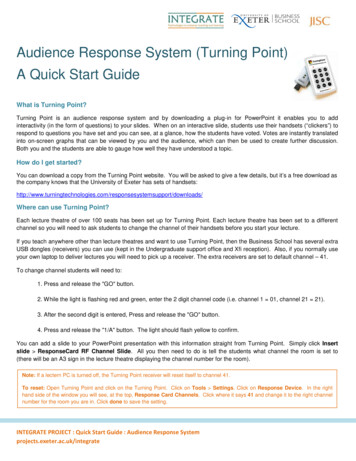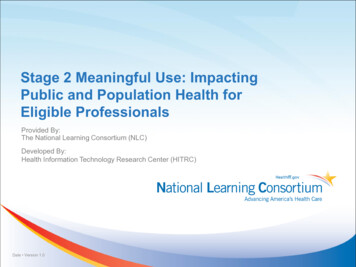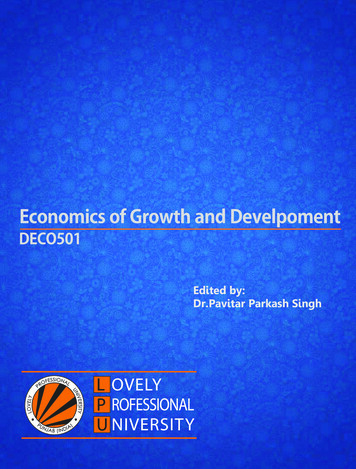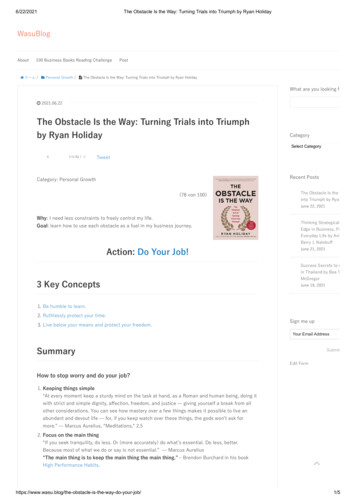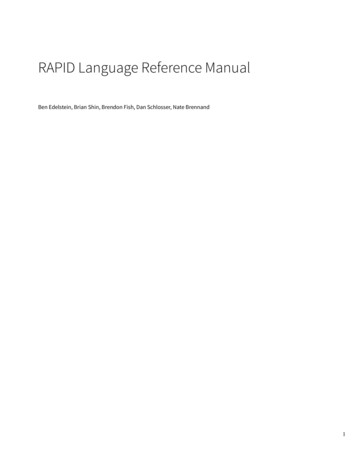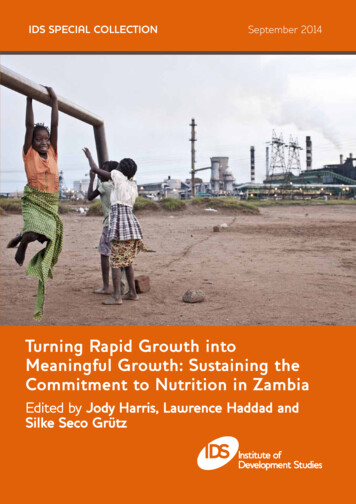
Transcription
IDS SPECIAL COLLECTIONSeptember 2014Turning Rapid Growth intoMeaningful Growth: Sustaining theCommitment to Nutrition in ZambiaEdited by Jody Harris, Lawrence Haddad andSilke Seco Grütz
Cover photograph Zambia, Kankoyo, Mufulira. A childswings from a set of goalposts on a football pitch on roughground beside the Mopani Copper Mine.Photographer Jason Larkin/PanosIDS Publishing Manager Alison NorwoodCopy-editor Dee ScholeyDesigner Barbara CheneyPrinter Nexus Design & Print LtdCitation Harris, Jody; Haddad, Lawrence and Grütz, Silke Seco(2014) Turning Rapid Growth into Meaningful Growth: Sustainingthe Commitment to Nutrition in Zambia, Brighton: IDSEditors Jody Harris, Lawrence Haddad and Silke Seco GrützPublished September 2014DisclaimersThe Institute of Development Studies and Editors cannot beheld responsible for errors or any consequences arising fromthe use of information contained in this report. The viewsand opinions expressed do not necessarily reflect those ofthe IDS and Editors.The results reported represent the views of the authors andnot necessarily those of DFID.Copyright Institute of Development Studies, 2014.ISBN 978-1-78118-181-2This is an Open Access report distributed underthe terms of the Creative Commons Attribution 4.0International License, which permits unrestricted use,distribution, and reproduction in any medium, provided theoriginal authors and source are 0/legalcodeFunding and competing interests Silke Seco Grütz is anemployee of DFID-Zambia. Lawrence Haddad receivedDFID funding for other projects. Jody Harris has nocompeting interests.Institute of Development StudiesBrightonBN1 9REUKwww.ids.ac.ukIDS is a charitable company limited by guarantee andregistered in England (No 877338).
IDS Special CollectionSeptember 2014Turning Rapid Growth into MeaningfulGrowth: Sustaining the Commitment toNutrition in ZambiaEditors Jody Harris, Lawrence Haddad and Silke Seco GrützForewordGuy ScottIntroduction – Turning Rapid Growth into Meaningful Growth: Sustaining the Commitment toNutrition in ZambiaJody Harris, Silke Seco Grütz, Cassim Masi and Lawrence Haddadix1KEY ISSUES AFFECTING UNDERNUTRITION IN ZAMBIAThe Impact of Rising Food Prices on Child Nutrition in ZambiaMiniva Chibuye10Does Exposure to Aflatoxin Constrain Efforts to Reduce Stunting in Zambia?Suraiya Ismail, John Shindano, Drinah Banda Nyirenda, Ranajit Bandyopadhyay and Juliet Akello22The Role of Fish in the First 1,000 Days in ZambiaCatherine Longley, Shakuntala Haraksingh Thilsted, Malcolm Beveridge, Steven Cole,Drinah Banda Nyirenda, Simon Heck and Anne-Louise Hother27RESPONSES TO CHILD UNDERNUTRITION IN ZAMBIA: PROGRAMME EXPERIENCESThe Impact of an Unconditional Cash Transfer on Food Security and Nutrition: The ZambiaChild Grant ProgrammeDavid Seidenfeld, Sudhanshu Handa, Gelson Tembo, Stanfield Michelo, Charlotte Harland Scott andLeah Prencipe36Cash or Food? Which Works Better to Improve Nutrition Status and Treatment Adherence forHIV Patients Starting Antiretroviral TherapyBeatrice Mazinza Kawana, Musonda J. Mofu, Ward S. Siamusantu, Kabaso F. Kabwe, Bupe B. Bwalya,Gelson Tembo, Jay Goulden and Levyson Banda43Spirulina Effectiveness Study on Child Malnutrition in ZambiaKazuya Masuda, Yuta Inoue, Ryo Inoue, Akiko Nakamura, Maureen Chitundu, Junko Murakami,Yumiko Ota and Junichiro Matsugami49The Rainbow Project: A Model to Fight Child Malnutrition in ZambiaStefania Moramarco, Giulia Amerio, Gloria Gozza Maradini and Elisabetta Garuti57Interventions and Approaches that are Proven to Work in Reducing Child Malnutrition in ZambiaChikontwe Mulenga62ROLE OF GOVERNMENT AND CIVIL SOCIETY IN SCALING UP NUTRITION RESPONSEThe Role of Civil Society in Spotlighting NutritionWilliam Chilufya, Marjolein Smit-Mwanamwenge and Eneyah Botoman Phiri66
Intersectoral Coordination for Nutrition in ZambiaScott Drimie, Subrata Kumar Chakrabarty, Christopher Dube, Marjolein Smit-Mwanamwenge,Rahul Rawat and Jody Harris72Reflections on the Role of Donors in Scaling Up Nutrition in Zambia from 2010 to 2013:Successes, Challenges and Lessons LearntSilke Seco Grütz, Maurice Sadlier and Dominique Brunet78Glossary85This IDS Special Collection was made possible by funding from the BritishGovernment’s Department for International Development (DFID) throughthe Maximising the Quality of Scaling Up Nutrition Programmes Framework(MQSUN), which provides technical assistance and knowledge services toDFID and its partners in support of pro-poor programmes in nutrition.MQSUN services are resourced by a consortium that is made up of eightnon-state organisations leading in the field of nutrition.
Notes on ContributorsJuliet Akello completed her BSc and MSc in BiomedicalSciences and Crop Science, respectively from MakerereUniversity between 2005 and 2008. She holds a PhD inPlant Pathology/Entomology from the University of Bonn.Currently, as an International Institute of TropicalAgriculture (IITA) employee, she is coordinating theAflatoxin mitigation project in Zambia. Previously, sheworked as a senior lecturer at Umutara Polytechnic,Quality Control and Assurance officer at MakerereUniversity Walter Reed Project and as a research assistantat IITA-Uganda. She has published six peer-reviewedjournal articles and ten conference proceedings.and institutional issues, and methods to managemycotoxins with a focus on biocontrol of aflatoxins. He has175 publications as journal articles, edited books, bookchapters, newsletter articles and conference proceedings.Community Association. She has lived and worked as amedical doctor in Zambia since 2006, coordinating theNutrition Programme for Children under five within theRainbow Project.Malcolm Beveridge is Director of Aquaculture andGenetics at WorldFish, and has a PhD in Ecology fromGlasgow University. His research interests includeaquaculture and fisheries and their impacts on theenvironment and on poverty and hunger. He was Directorof the Scottish Government Freshwater Laboratory(2001–06). From 1984 to 2001 he was on the academicstaff at the Institute of Aquaculture, Stirling University.He was awarded a Food and Agriculture Organization(FAO) Andre Mayer Research Fellowship at the Universityof the Philippines (1983). He was Visiting Research Fellowat Imperial College London (2008) and Buckland FisheriesProfessor (2009).Levyson Banda has a BA in Education, University ofDominique Brunet currently works as a nutrition specialistZambia, with twelve years’ experience in project planning,implementation, and monitoring and evaluation, includingresearch. He worked for six years with Cooperative forAssistance and Relief Everywhere (CARE) InternationalZambia as Project Manager for programmes focusing onwater, sanitation and hygiene in schools (funded by the USAgency for International Development, USAID), and onSocial Cash Transfers (funded by the Department forInternational Development, DFID). He was ProjectManager for this antiretroviral therapy (ART) adherenceresearch study. Before joining CARE, Levyson worked as aCapacity Development Specialist for the World Bankfunded Zambia Social Investment Fund.with the United Nations Children’s Fund (UNICEF) Zambia.She has over 15 years’ experience with internationalorganisations in the area of nutrition, food security andlivelihood in developing countries in emergency anddevelopment settings. She holds a Masters degree inHuman Nutrition from the University of Aberdeen, Scotland.Giulia Amerio is a member of the Pope John 23rdDrinah Banda Nyirenda obtained her BSc (AgriculturalSciences) from the University of Zambia and her MSc(Animal Sciences) and PhD (Human Nutrition) from theUniversity of California, Davis. She has worked at theUniversity of Zambia for 26 years, and is currently Head ofthe Department of Animal Sciences, School of AgriculturalSciences. In 2011 as nutrition promoter, she successfullylaunched the first BSc in Human Nutrition in Zambia. Shehas conducted extensive research into the nutritive valueof local foods, and of cassava and fish in improving foodsecurity. She was Executive Director of a nongovernmental organisation (NGO) working to mitigate theimpact of food disasters and improve food security.Ranajit Bandyopadhyay is a plant pathologist at theInternational Institute of Tropical Agriculture (IITA),based in Nigeria. Ranajit has more than 32 years’experience in agricultural research in Asia, Africa, NorthAmerica and Latin America. He is currently responsiblefor IITA’s Africa-wide research on maize, soyabean,cowpea, cassava, banana and yam diseases. His researchon mycotoxins focuses on developing an understanding oftheir occurrence, the bio-ecology of toxigenic fungi, policyBupe B. Bwalya has a BA with a Major in Demography andMinor in Economics, and an MA in Population Studiesfrom the University of Zambia. He has worked as astatistician for the National Food and NutritionCommission, and as Research Manager for the Society forFamily Health, and has been involved in many researchactivities throughout his working career. Currently, he isworking as Social Economic Planner for ChipataMunicipal Council and tutor in Research Methods,Development Administration and Business Economics forthe University of Zambia.Subrata Kumar Chakrabarty is a livelihoods specialist withextensive experience in project/programme managementin Zambia, Malawi and Bangladesh. He was theRealigning Agriculture to Improve Nutrition (RAIN)project manager of Concern Worldwide Zambia. As part ofthe RAIN project, he led the intersectoral coordination ofagriculture and health/nutrition at district and extensionlevel. He has more than 21 years’ experience inprogramme development and management, livelihoodsdevelopment, monitoring and evaluation and research. Hemanages the Feed the Future/US Agency for InternationalDevelopment- (USAID) supported ‘Cereal SystemsInitiative for the South Asia-Mechanization and Irrigation’project of the International Maize and WheatImprovement Center (CIMMYT) in Bangladesh.Miniva Chibuye is a third year doctoral student at theInstitute of Development Studies. Using econometricIDS Special Collection September 2014iii
methods, she assesses the impact of rising food prices onhousehold welfare in Zambia. She previously worked as aresearch consultant for FAO in Rome and theInternational Labour Organization (ILO). Before that, shemanaged the Social Conditions Programme at the JesuitCentre for Theological Reflection in Zambia, whichfocused on evidence-based advocacy on varioussocioeconomic issues, including basic commodity prices,employment and poverty. She has an MSc in Social Policyand Development from the London School of Economics.William Chilufya is Country Coordinator at the ZambiaCivil Society Scaling Up Nutrition (CSO-SUN) Alliance.William is a civil society advocate with nine years’experience in championing pro-poor development inZambia. Currently he is leading the CSO-SUN Alliance’sadvocacy agenda in Zambia. He provides leadership andoverall direction in programme implementation to have aZambia where every mother and child is assured ofsufficient nutrition.Maureen Chitundu is a nutritionist. She works as theActing Executive Director with the Programme AgainstMalnutrition, a local NGO in Lusaka, and collaborateswith research institutions and other organisations inconducting research in food security and nutrition.Steven Cole works for WorldFish. He obtained his PhD inBiological Anthropology from the University of Arizona.He also holds an MSc in Agricultural Economics. He iscurrently carrying out gender transformative research forthe Consultative Group on International AgriculturalResearch (CGIAR) Programme on Aquatic AgriculturalSystems (AAS) in the Barotse Floodplain, Zambia. Beforejoining WorldFish, Steven’s research took place inZambia’s Eastern Province, where he explored intricaterelationships between food insecurity and mental health,relative deprivation and adult nutritional status, andwhether a household’s participation in ganyu (piecework) isa robust indicator of vulnerability to food insecurity.Scott Drimie leads a research and facilitation consultancyfocused on food security, food systems and livelihood issuesparticularly in southern and eastern Africa. He is anAssociate Professor (Extraordinary) in the Department ofInterdisciplinary Health Sciences at Stellenbosch Universitywhere he chairs the Advisory Board of the University’s FoodSecurity Initiative. Scott is also the Director of the SouthernAfrica Food Lab (www.SouthernAfricafoodlab.org), which isa multi-stakeholder initiative that brings together diverserole players in the regional food system to identify and pilotinnovative means to achieve long-term, sustainable foodsecurity.Christopher Dube of the Ministry of CommunityDevelopment, Mother and Child Health, Zambia, is amedical doctor and holds a Masters degree in PublicHealth from the University College in Dublin. He hasbeen working in the health sector since 2000 and is theDistrict Medical Officer (DMO) overseeing the healthservice delivery and government policy implementation inMumbwa District in Central Province, Zambia. Dr Dubemanaged to improve the health service delivery inMumbwa, which became one of the best performingivdistricts in Zambia. He is also the chairman of the DistrictNutrition Coordinating Committee in Mumbwa.Elisabetta Garuti graduated in economics and commerce,and has been a member of the Pope John 23rd CommunityAssociation since 1983. According to the Association’smission, she shares her family life with people in need –such as vulnerable children, former drug addicts, andphysically and learning-disabled people. She lived inZambia for five years and has coordinated the RainbowProject since 1998, a large-scale model of care for orphanand vulnerable children. Since 2004 she has also been thegeneral coordinator of the NGO Pope John 23rdCommunity Association – Sharing among Peoples withprojects in 25 countries worldwide.Jay Goulden of CARE International Zambia is a seniorprogramme manager with over 20 years’ experience ofleading international development programmes, includingon nutrition, maternal health and gender equality. With aBA from Oxford University, he has nine years’ experiencein developing countries, leading strategy development andimplementation, and in technical support to localorganisations and social movements. Jay has expertise inrights-based approaches to development, civil society andgovernance, advocacy, monitoring and evaluation, andcapacity strengthening. He supervised the projectmanagers working on the antiretroviral therapy (ART)study and co-led the development of abstracts and articlesto share the results.Gloria Gozza Maradini is a member of the Pope John 23rdCommunity Association. She has been a missionary inZambia since 1995 and is the National Coordinator of theRainbow Project.Lawrence Haddad is a Senior Research Fellow in theInternational Food Policy Research Institute (IFPRI)Poverty Health and Nutrition Division. He was theDirector of the Institute of Development Studies from2004 to 2014. Prior to that he was a Division Director atIFPRI and a Lecturer in Development Economics at theUniversity of Warwick, UK. He is an economist and hismain research interests are at the intersection of poverty,food insecurity and malnutrition.Sudhanshu Handa is Professor in the Department of PublicPolicy, University of North Carolina, Chapel Hill andcurrently serves as Chief of Social and Economic Policy atthe UNICEF Innocenti Research Center. An economist bytraining, Sudhanshu’s research is on human resources andchild development. He is the principal investigator (PI) onthe Transfer Project, a joint learning initiative withUNICEF, FAO and Save the Children UK (SCUK)studying the effects of social cash transfers on families andchildren in sub-Saharan Africa.Charlotte Harland Scott has worked on social transfers inZambia since the mid-1990s, one of the earliest movestowards developing national social protection systems inAfrica. She completed her PhD as part of the Wellbeing inDeveloping Countries group at Bath University (2007),joining UNICEF Zambia as Chief of Social and EconomicPolicy, Planning, Monitoring and Evaluation. In this role,Harris et al. Turning Rapid Growth into Meaningful Growth: Sustaining the Commitment to Nutrition in Zambia
she was responsible for the introduction of a largerandomised controlled trial (RCT) evaluation of the pilotcash transfer programmes which contributed to theZambian government’s recent decision to finance anational scale-up. She is a Visiting Fellow at the Instituteof Development Studies.Jody Harris is a Senior Research Analyst in the Poverty,Health and Nutrition Division of the International FoodPolicy Research Institute (IFPRI). Her interest isprimarily around the theory and practice of linking theagriculture and health sectors for nutrition outcomes,including the study of intersectoral coordination ingovernment and non-governmental organisation (NGO)systems, and evaluation of integrated programmes fornutrition. Jody has worked in various contexts in SouthAsia and East Africa, particularly Zambia, and isundertaking a PhD in Nutrition Policy and Governancewith the Leverhulme Centre for Integrative Research onAgriculture and Health (LCIRAH), University of London.Simon Heck is a scientist and programme leader with theInternational Potato Center (CIP) in Uganda. His currentresearch is on scaling up integrated agriculture–nutrition–market interventions for biofortified crops, specificallysweet potato, and he contributes to several ConsultativeGroup on International Agricultural Research (CGIAR)research programmes in this respect. Prior to this, he wasa scientist with WorldFish in Zambia. He has a PhD inAnthropology and has done research on food systems,agriculture extension, and agro-enterprise development.Anne-Louise Hother is presently a nutrition consultant atWorldFish Bangladesh (www.worldfishcenter.org), one ofthe 15 international research centres in the ConsultativeGroup on International Agricultural Research (CGIAR)(www.cgiar.org). Her area of research and expertise isinternational child nutrition. She has an MSc in HumanNutrition from the University of Copenhagen, Denmarkand has completed her PhD field research in Ethiopia,focusing on nutritional rehabilitation of children withsevere acute malnutrition (SAM). At WorldFish, she isconducting research activities and interventions related tothe role of fish in the first 1,000 days of life.Ryo Inoue is a graduate school student at the School ofEconomics, Hitotubashi University. His research interestsinclude household rural income diversification, copingstrategies and vulnerability against risks. He is also aresearch assistant at the Alliance Forum Foundation.Yuta Inoue is an MSc course student at the School ofInternational Health, University of Tokyo. He is also aresearch assistant at the Alliance Forum Foundation.Suraiya Ismail obtained a BA from Cambridge Universityand a PhD in International Nutrition from CornellUniversity. She worked as a lecturer at the University ofthe West Indies, a nutrition officer in FAO, and as a seniorlecturer at the London School of Hygiene and TropicalMedicine. In 2001 she established a consultancy firm inGuyana that undertook numerous pilot projects andimpact evaluations of large-scale nutrition programmesfor development banks, funding agencies and governmentministries. She is currently Visiting Professor at the Schoolof Agricultural Sciences, University of Zambia, helping todevelop the new BSc in Human Nutrition.Kabaso F. Kabwe is an economist, holder of a Bachelor ofCommerce degree from the University of South Africa,with a Diploma in Food and Nutrition from the NaturalResources Development College. He has been a seniormember of the research team at the National Food andNutrition Commission in Zambia for over seven yearscarrying out a number of studies including the MaternalNutrition Study, Trends Assessment of Malnutrition infirst and second level hospitals, and the Cost of ChildHealth Week in Zambia, among others. His broadexperience in research has been of great significance tothe team.Beatrice Mazinza Kawana is a senior nutrition and dieteticspecialist with a Masters degree in Nutrition and Dieteticswith Government under the National Food and NutritionCommission, and was Deputy Director and Head ofProgrammes. Beatrice has worked extensively withpartners, NGOs and the United Nations and has workedon assignments in Malawi, Swaziland, Lesotho, Namibiaand South Africa. She is Senior Technical Advisor forPATH under the Thrive Project, funded by the US Agencyfor International Development (USAID), spearheadingNutrition Assessment Counselling and Support for PeopleLiving with HIV and AIDS. Beatrice was lead researcherfor the antiretroviral therapy adherence study, and alsoco-led the Zambia Food Consumption Survey.Catherine Longley is a Senior Scientist with WorldFish,based in Lusaka, Zambia. She previously worked as aResearch Fellow for the Overseas Development Institute(1998–2009) and has over 20 years’ experience of appliedresearch into rural livelihoods and food security,encompassing value chains, technology dissemination,research and extension, seed systems, and disaster riskmanagement. She is increasingly becoming involved inresearch that explores the linkages between agriculture,value chains, nutrition and food safety. She holds a PhD inSocial Anthropology from University College London.Cassim Masi was former CEO of the National Food andNutrition Commission of Zambia for nearly five years andpioneered Zambia’s inclusion as an ‘early riser’ countryunder the Scaling Up Nutrition (SUN) movement. He ledefforts towards Zambia’s first-ever National Multi-sectoralNutrition Strategy 2011–15, the First 1000 Most CriticalDays Programme (MCDP), and has more than 20 years’experience of managing programmes in sustainableagriculture, food security and livelihoods, health andHIV/AIDS. He has worked for the Ministry of Agriculture,Ministry of Environment, World Vision Zambia andAfricare, and has a doctorate degree in agronomy from theUniversity of Nebraska, USA.Kazuya Masuda is a senior Research Fellow at the AllianceForum Foundation. He is also a PhD candidate inDevelopment Economics at the National GraduateInstitute for Policy Studies, and received his MA inInternational Development Studies from the NationalGraduate Institute for Policy Studies.IDS Special Collection September 2014v
Junichiro Matsugami presently holds the position ofProgramme Manager at the Alliance Forum Foundation(AFF). Prior to joining AFF, he worked for the MonitorGroup, a management consulting firm, and was engagedprimarily in marketing projects. At AFF, he managesmainly nutrition improvement projects in Africa andSouth Asia. He graduated from Kobe University with anMA in Economics and from the University of East Angliawith an MA in Development and Politics.Stanfield Michelo is currently Director of the SocialWelfare Department in the Ministry of CommunityDevelopment, Mother and Child Health (MCDMCH). Heholds a Masters degree in Development Managementfrom Ruhr University in Germany. He has been part of thepioneering efforts of introducing the Social Cash TransferScheme since 2003 when the scheme started in Zambia.Imbued with a strong interest in the design of SocialProtection interventions, he led the team that designedthe Child Grant Scheme.Musonda J. Mofu is currently acting Deputy Director andHead of Research and Planning at the National Food andNutrition Commission of Zambia, where he is responsiblefor programme implementation. As a public healthnutritionist with 18 years’ experience, he has undertakennutrition surveys as the basis for nutrition situationdiagnosis. His efforts are now focused on food compositionpolicy synthesis and analysis, in addition to understandingthe determinants of food consumption and nutritionstatus. He has also participated and undertaken variousstudies, including assessing the impact of a foodsupplement on nutrition status and body compositionamong HIV infected women.Stefania Moramarco is a dietician who graduated from theUniversità Cattolica del Sacro Cuore. Since 2011 she hasbeen working in Zambia as supervisor for the RainbowProject’s supplementary feeding programmes formalnourished children. In 2010 she obtained a Mastersdegree in Human Nutrition from the Tor Vergata University.Her main area of research is malnutrition in developingcountries, with a special focus on Africa. In her Mastersthesis she analysed the effectiveness of internationalprotocols for the management of acute malnutrition inchildren. On the same topic, a handbook has been publishedand is used as training material at Tor Vergata University.Chikontwe Mulenga is a Zambian national from LuwinguDistrict, Northern Province. He is Development FacilitatorHIV and AIDS/Health for World Vision Zambia, LungaArea Development Programme, Mwinilunga District, NorthWestern Province. He graduated with a BA in DevelopmentStudies from the Zambian Open University and a Diplomain Project Planning and Management from MulungushiUniversity. He is a highly experienced developmentpractitioner with more than five years’ experience inimplementing health, HIV/AIDS and water and sanitationinterventions. Chikontwe works with community structuressuch as churches and neighbourhood health committees toenhance the welfare of people, especially children.Junko Murakami presently holds the position ofProgramme Officer at the Alliance Forum Foundation. Hevihas been involved in the nutrition and development sectorsince 2010. He is an alumnus of the Department ofEconomics, Faculty of Arts, University of Calgary, Canada.Akiko Nakamura is Country Manager of the Zambia Officeat the Alliance Forum Foundation. She graduated fromNippon Sports Science University.Yumiko Ota is Program Officer at the Alliance ForumFoundation. She has worked for child andmaternal/lactating mothers’ nutrition improvementproject in Bangladesh and Zambia. She received herMasters degree from the University of California, LosAngeles in Urban and Regional Planning.Eneyah Botoman Phiri is Communications andAdministration Officer at the Zambia Civil Society ScalingUp Nutrition (CSO-SUN) Alliance Secretariat. Eneyah isa public administration graduate from the University ofZambia. He joined CSO-SUN as an intern immediatelyafter his studies, a position he held for four months.Leah Prencipe is a research associate at American Institutesfor Research (AIR) with several years’ experience ofconducting impact evaluations of health, education andsocial protection programmes. She received her Mastersdegree in Public Health from Stony Brook Universitywhere she earned an award for Overall Excellence inPublic Health. She has experience with survey design,enumerator training and coordination, and leadingquantitative analysis of outcomes in health, early childhooddevelopment and nutrition. As a consultant for the WorldBank, Leah analysed data from multiple nationallyrepresentative surveys for inequalities in health spending,utilisation and outcomes. She has conducted research inZambia, Cambodia, Vietnam, Bangladesh and Mozambique.Rahul Rawat is a Research Fellow in the Poverty, Health, andNutrition Division at the International Food Policy ResearchInstitute (IFPRI). One of his key responsibilities is his workon a research partnership between Concern Worldwide andIFPRI in the area of food security, livelihoods, and maternaland child health and nutrition. He conducted research onHIV and nutrition within the Regional Network on AIDS,Livelihoods and Food Security (RENEWAL) programme ineastern and southern Africa. Additionally, he is part of theglobal monitoring and evaluation team of the infant andyoung child feeding initiative, Alive and Thrive, beingconducted with implementing partners in Bangladesh,Ethiopia and Vietnam.Maurice Sadlier currently works as Assistant CountryDirector – Programme Quality with Concern Worldwide inTanzania. Previous to this he was Programme Officer withthe Embassy of Ireland/Irish Aid in Zambia responsiblefor, among others, Ireland’s work on Scaling Up Nutritionand Food and Nutrition Security. He holds a Masters degreein Development Studies from University College Dublin.Silke Seco Grütz works for the UK Department forInternational Development (DFID) as a Health andNutrition Advisor. She is currently based in Zambia whereshe is co-convener of the nutrition cooperating partnersgroup and oversees DFID Zambia’s nutrition programme.Harris et al. Turning Rapid Growth into Meaningful Growth: Sustaining the Commitment to Nutrition in Zambia
She has over ten years’ experience working on internationalpublic health, HIV, nutrition and broader humandevelopment issues in the UK, Latin America and India.She holds an MSc in Public Health Policy from the LondonSchool of Hygiene and Tropical Medicine and a Mastersdegree in Social Anthropology from the University ofKent, UK.David Seidenfeld is a senior researcher at AmericanInstitutes for Research (AIR), and has over ten years’experience of working with government agencies and nongovernmental organisations (NGOs) as a researcher andprogramme coordinator. He has extensive experiencedesigning and implementing evaluations of economic,health and education programmes. Dr Seidenfeld is theco-principal investigator (PI) on a five-year randomisedcontrolled trial of Zambia’s cash transfer programmes,co-transfer programme, and co-PI on a study of condomdemand in rural Africa. He holds a PhD in educationpolicy from the University of Pennsylvania.John Shindano obtained his BSc in Chemistry from theUniversity of Zambia in 1994, his MSc in Food Science andTechnology in 1998 and PhD in Food Science andTechnology from Gent University, Belgium in 2007. Heworked in the private sector as Quality Assurance Officerfor the National Milling Company f
University of California, Davis. She has worked at the University of Zambia for 26 years, and is currently Head of the Department of Animal Sciences, School of Agricultural Sciences. In 2011 as nutrition promoter, she successfully launched the first BSc in Human Nutrition in Zambia. She has conducted extensive research into the nutritive value

